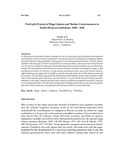Please use this identifier to cite or link to this item:
https://cris.library.msu.ac.zw//handle/11408/750| Title: | The early history of wage labour and worker consciousness in North-Western Zimbabwe, 1898 - 1940 | Authors: | Ncube, Godfrey Tabona | Keywords: | Wage, labour, indigeous, earlyhistory, Zimbabwe | Issue Date: | 2012 | Publisher: | Midlands State University | Series/Report no.: | The Dyke;Vol. 6; No. 3; p.155-177 | Abstract: | In the early colonial period European employers in the country experienced great labour shortages and uncertainty as a result of several crucial factors. One was the general unwillingness of indigenous African societies to submit to wage exploitation, as long as the rural economy provided an option. In North-western Zimbabwe the Shangwe were able to expand their pre-colonial tobacco industry on the onset of colonial rule to meet the colonial tax demands, and thereby delayed their proletarianization by more than three decades. The second factor is that all the mines, farms and other companies which paid low wages, or had reputations of worker ill-treatment, or high accident and sickness rates, such as the Wankie Colliery, suffered shortages throughout the era of labour migration and often had to turn to the state for provision of forced labour. One of the key reasons behind the formation of the Rhodesia Native Labour Bureau in 1903 was to intercept and capture Africans, and channel them to mines like the Wankie Colliery and other employers in the region, who because of their poor working conditions and exploitative practices, could not secure independent labour. The restriction of independent mobility and desertion by the compound system and other colonial measures, eventually led to the evolution of labour protest and strikes. | URI: | http://hdl.handle.net/11408/750 | ISSN: | 1815-9036 |
| Appears in Collections: | Research Papers |
Files in This Item:
| File | Description | Size | Format | |
|---|---|---|---|---|
| history.pdf | 292.84 kB | Adobe PDF |  View/Open |
Page view(s)
166
checked on Feb 10, 2026
Download(s)
242
checked on Feb 10, 2026
Google ScholarTM
Check
Items in MSUIR are protected by copyright, with all rights reserved, unless otherwise indicated.



